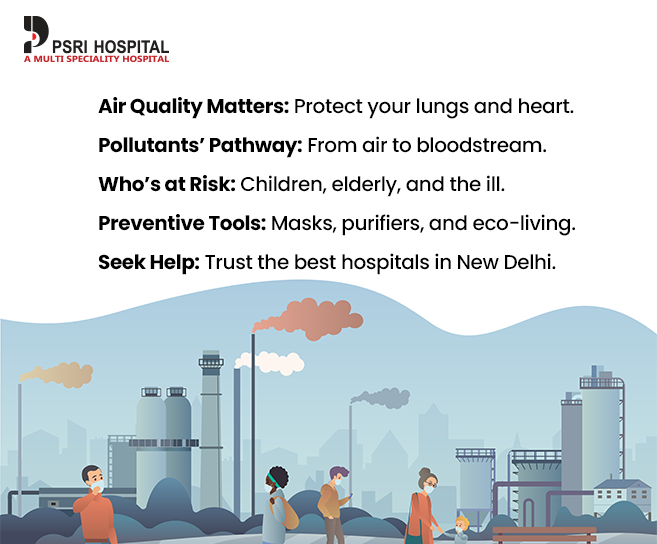Understanding the Impact of Air Pollution on Lungs and Heart

Can the invisible particles in the air you breathe dictate the course of your health? For millions worldwide, air pollution is an omnipresent threat, silently affecting the lungs and heart. With worsening urban air quality and a rise in respiratory and cardiovascular diseases, it’s time to explore the deeper implications of air pollution on human health and uncover actionable insights. The World Health Organization (WHO) estimates that 99% of the global population breathes air that exceeds recommended pollution limits, underscoring the urgency of addressing this issue. Every breath you take carries a mix of pollutants that could lead to chronic illnesses or exacerbate existing conditions. Understanding the sources and effects of air pollution can empower individuals and communities to adopt preventive measures and demand systemic changes for cleaner air.
The Unseen Enemy: Air Pollution and Its Composition
Air pollution comprises harmful substances like particulate matter (PM), nitrogen dioxide (NO2), sulfur dioxide (SO2), carbon monoxide (CO), and ground-level ozone. Particulate matter, especially PM2.5 and PM10, is of significant concern due to its ability to penetrate deep into the lungs and bloodstream. But how exactly do these pollutants wreak havoc?

Air Pollution Impact on Lungs: A Closer Look
Immediate Effects:
Irritation and Inflammation: Pollutants like PM2.5 irritate the respiratory tract, causing inflammation. This leads to coughing, wheezing, and shortness of breath, especially in individuals with asthma or chronic bronchitis.
Long-Term Consequences:
Chronic Obstructive Pulmonary Disease (COPD): Long-term exposure to air pollution is a leading cause of COPD. The progressive narrowing of airways makes breathing increasingly difficult.
Lung Cancer Risk: Studies link prolonged exposure to polluted air with an elevated risk of lung cancer. The International Agency for Research on Cancer (IARC) has classified outdoor air pollution as a carcinogen.
Did you know the best ENT doctor in Delhi NCR often treats patients whose conditions are exacerbated by air pollution? Addressing respiratory distress requires advanced care, often found in the best hospitals in Delhi.
Air Pollution Impact on Heart: More Than Just a Breathing Issue
Acute Reactions:
Increased Heart Rate and Blood Pressure: Pollutants like CO and NO2 can trigger acute cardiovascular responses, such as elevated heart rate and blood pressure.
Chronic Effects:
Atherosclerosis Development: Prolonged exposure to air pollution accelerates the build-up of plaque in arteries, restricting blood flow and increasing the risk of heart attacks and strokes.
Heart Failure: Polluted air contributes to oxidative stress and systemic inflammation, which can weaken the heart’s ability to pump blood efficiently.
In New Delhi, known for its alarming air quality, cardiovascular conditions are surging. Accessing treatment at the best hospital in Delhi NCR or consulting the top ENT specialist in Delhi can make a significant difference for affected individuals.
Who Is Most at Risk?
While air pollution affects everyone, some groups are particularly vulnerable:
- Children: Developing lungs are more susceptible to damage.
- Elderly: Aging weakens the body’s defense mechanisms.
- Individuals with Pre-existing Conditions: People with asthma, COPD, or cardiovascular diseases experience more severe effects.
Seeking timely care at the best hospitals in New Delhi ensures comprehensive diagnosis and treatment.
Historical Context: A Growing Crisis
The industrial revolution marked the beginning of large-scale air pollution. In recent decades, urbanization, vehicular emissions, and industrial activities have exacerbated the problem. India, particularly Delhi, consistently ranks among the cities with the poorest air quality. These developments underscore the need for systemic change and individual vigilance.
Solutions and Preventive Measures
Personal Actions:
Mask Usage: Wear N95 masks to reduce inhalation of harmful pollutants.
Indoor Air Purifiers: Invest in HEPA air purifiers for a safer indoor environment.
Community-Level Interventions:
Green Spaces: Advocate for more trees and parks to absorb pollutants.
Public Transportation: Shift to eco-friendly commuting options to reduce vehicular emissions.
Medical Interventions:
If symptoms persist, seeking expert consultation is critical. Patients can visit the best cardiologist in delhi ncr or get treated at the best hospital in New Delhi for a comprehensive care plan.
The Way Forward: Are You Ready to Take Charge?
What steps will you take to shield your lungs and heart from air pollution’s invisible grip? Whether it’s adopting preventive measures or consulting experts at the best hospital in Delhi, the choice is yours. Act now and consider whitening treatment at PSRI for comprehensive health support.
Think about the daily choices you make. Are you limiting exposure during high-pollution days, staying informed about air quality levels, or advocating for cleaner air policies in your community? These small but significant actions can collectively lead to a healthier life. For those already experiencing symptoms, timely intervention can prevent complications. From advanced diagnostic tools to holistic treatment plans, PSRI Hospital offers unparalleled care. Let’s breathe easier, live healthier, and work together to create an environment where clean air is not a luxury but a right for everyone. Will you take the first step towards safeguarding your health today?
FAQs
How does air pollution directly affect the lungs?
Ans. Air pollution causes irritation and inflammation, leading to chronic respiratory diseases like asthma and COPD.
Can air pollution lead to heart problems?
Ans. Yes, prolonged exposure can cause cardiovascular issues like atherosclerosis, heart attacks, and strokes.
Who should be most cautious about air pollution exposure?
Ans. Children, the elderly, and individuals with pre-existing conditions are the most vulnerable.
How can I protect myself from air pollution?
Ans. Wear masks, use air purifiers, and limit outdoor activities during high-pollution periods.
Where can I find expert care for respiratory or cardiovascular issues?
Ans. Consult the best cardiac hospital in Delhi NCR or visit the best hospital in Delhi for specialized care.

 Book An Appointment
Book An Appointment Virtual Consultation
Virtual Consultation





